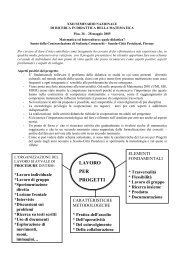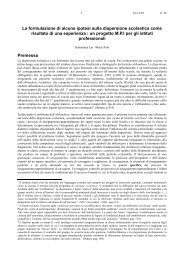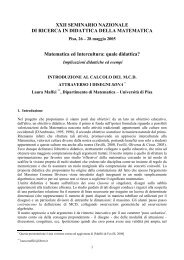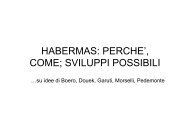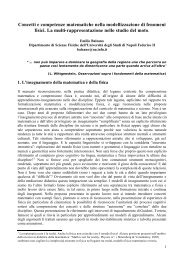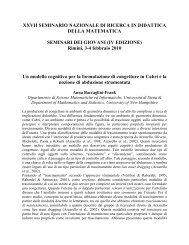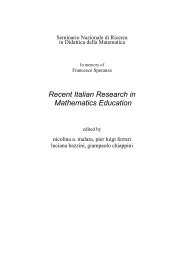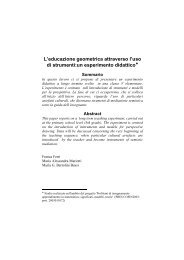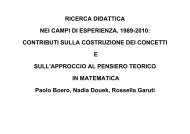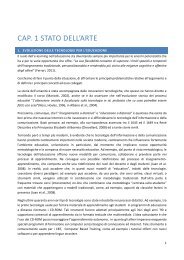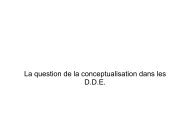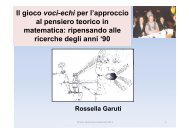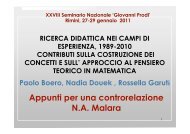2. personalizzazione dei processi di insegnamento-apprendimento
2. personalizzazione dei processi di insegnamento-apprendimento
2. personalizzazione dei processi di insegnamento-apprendimento
Create successful ePaper yourself
Turn your PDF publications into a flip-book with our unique Google optimized e-Paper software.
BIBLIOGRAFIA<br />
Albano, G. (2011a). Mathematics education: teaching and learning opportunities in blended learning. In A.<br />
Juan, A. Huertas, S. Trenholm and C. Steegmann (eds): Teaching Mathematics Online: Emergent<br />
Technologies and Methodologies – pp. 60‐89. ISBN: 10.4018/978‐1‐60960‐875‐0 (hardcover) ‐‐ ISBN<br />
978‐1‐60960‐876‐7 (ebook) ‐‐ ISBN 978‐1‐60960‐877‐4 (print & perpetual access), ISBN13:<br />
9781609608750, ISBN10: 1609608755, EISBN13: 9781609608767, DOI: 10.4018/978‐1‐60960‐875‐<br />
0.ch004.<br />
Albano, G. (2011b). Learning objects e percorsi <strong>di</strong> appren<strong>di</strong>mento personalizzato in piattaforme <strong>di</strong> e‐<br />
learning. Tecnologie Didattiche TD N.54 Numero 3 (<strong>di</strong>cembre) 2011, ISSN: 1970‐061X – pp. 142‐146.<br />
Albano, G., Ascione, R. (2007). Affective profiling in mathematics e‐learning: a preliminary study. In López<br />
Eire, Antonio (<strong>di</strong>r); García Peñalvo, Francisco José (ed. lit); Seoane Pardo, Antonio Miguel (ed. lit);<br />
Morales Morgado, Erla Mariela (ed. lit), Proc. of eUniverSALearning 07 – pp. 144‐149, ISBN: 978‐84‐<br />
930218‐4‐9<br />
Albano, G., Ascione, R. (2008). E‐Learning and Affective Student’s Profile in Mathematics. Int. J. of Emerging<br />
Technologies in Learning, Vol. 3 (2008), Special Issue: ICL2008, ISSN: 1863‐0383, pp. 6‐13.<br />
Balacheff, N. (2000). A modelling challenge: untangling learners’ knowing’. Journées Internationales<br />
d’Orsay sur les Sciences Cognitives:L’apprentissage, JIOSC2000, Paris.<br />
Balacheff N. (2000). Teaching, an emergent property of eLearning environments. The information society<br />
for all. http://www‐<strong>di</strong>dactique.imag.fr/Balacheff/TextesDivers/IST2000.html<br />
Balacheff, N., Sutherland, R. (1999). Didactical Complexity of Computational Environments for the Learning<br />
of Mathematics. International Journal of Computers for Mathematical Learning, Volume 4, Issue 1,<br />
pp 1‐26.<br />
Baldacci M. (2006). Personalizzazione o in<strong>di</strong>vidualizzazione? Centro Stu<strong>di</strong> Erickson.<br />
Barnard & Tall (1997). Cognitive units, connections and mathematical proof. Proc. Of the 21 st Conference of<br />
PME, 2, 41‐48.<br />
Boscolo, P. (1997). Psicologia dell’appren<strong>di</strong>mento scolastico. Aspetti cognitivi e motivazionali. UTET Libreria.<br />
Capuano, N., Gaeta, M., Marengo, A., Miranda, S., Orciuoli, F., Ritrovato, P. (2009). LIA: an Intelligent<br />
Advisor for e‐Learning. Intearctive Learning Environments, Vol. 17, Issue 3, pp. 221‐239<br />
Crowley & Tall (1999). The roles of cognitive units, connections and procedures in achieving goals in college<br />
algebra. Proc. Of the 23 rd Conference of PME, 2, 225‐23<strong>2.</strong><br />
D’Amore, B. (1999). Elementi <strong>di</strong> <strong>di</strong>dattica della matematica. Pitagora E<strong>di</strong>trice Bologna.<br />
Dubinsky, E.(1991). ‘Reflective abstraction in advanced mathematical thinking’. In D. Tall (Ed.). Advanced<br />
mathemathical thinking (pp. 95‐123). Dordrecht (NL): Kluwer.



